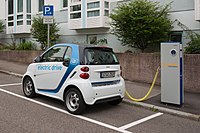As of November 2021 [update], there were about 30,000 electric vehicles in Massachusetts. [1]
In July 2021, Massachusetts was ranked by AutoInsuranceEZ as the second-best state in the United States to own an electric car, behind California. [2]
Government policy
In December 2020, the state government announced a requirement that all new cars sold in the state be electric by 2035. [3]
As of November 2021 [update], the state offers a $2,500 tax rebate for electric vehicle purchases. [4]
Charging stations
As of 2022 [update], there were around 1,600 charging stations in Massachusetts. [5]
In February 2022, the state government announced a US$13 million program to build charging stations. [6]
Public opinion
A poll conducted in 2021 by Coltura and the Green Energy Consumers Alliance showed that 56% of Massachusetts voters were likely to buy an electric vehicle in the next five years. [4]
By region
Boston
As of 2019 [update], there were about 2,000 electric vehicles registered in Boston. [7] As of 2023 [update], 8% of new cars registered in Greater Boston were electric. [8]
As of December 2021 [update], there were 10 municipally-owned charging stations in Boston. In December 2021, Boston mayor Michelle Wu announced plans to add about 70 additional charging stations. [9]
Cape Cod
As of February 2024 [update], there were four public charging stations in Orleans, three in Harwich, and none in Chatham or Brewster. [10]
Springfield
Springfield installed the first public charging stations in Western Massachusetts in 2018 at Union Station. [11]
Worcester
As of 2021 [update], about 4% of vehicles in Worcester were electric. [12]
References
- ^ "Buying an electric car? Here's what you need to know". WCVB. November 3, 2021. Archived from the original on March 24, 2022. Retrieved March 24, 2022.
- ^ D'Amours, Kristina (July 14, 2021). "Study: Massachusetts is the second-best state to own electric car". WWLP. Archived from the original on August 3, 2021. Retrieved March 24, 2022.
- ^ Martin, Naomi (December 30, 2020). "Mass. to require all new cars sold to be electric by 2035 as part of climate-change measures". The Boston Globe. Archived from the original on January 26, 2021. Retrieved March 24, 2022.
- ^ a b Shemkus, Sarah (November 16, 2021). "Poll: Majority of Massachusetts drivers expect to own electric vehicle soon". Energy News Network. Archived from the original on March 29, 2022. Retrieved March 24, 2022.
- ^ Solis, Steph (August 3, 2022). "Massachusetts poised to turbocharge EV network". Axios. Archived from the original on September 7, 2022. Retrieved September 6, 2022.
- ^ "Mass. provides $13 million for 300 electric vehicle charging stations". WBUR. February 6, 2022. Archived from the original on March 3, 2022. Retrieved March 24, 2022.
- ^ Wintersmith, Saraya (December 17, 2021). "Boston aims to tamp down vehicle emissions with more electric charging stations". WGBH. Archived from the original on March 24, 2022. Retrieved March 24, 2022.
- ^ Enwemeka, Zeninjor (April 5, 2024). "There are more electric vehicles in Boston, but the region lags behind other metros". WBUR. Retrieved April 21, 2024.
- ^ Nanos, Janelle (December 10, 2021). "Mayor Wu announces new electric vehicle plan in effort to reduce vehicle emissions". The Boston Globe. Archived from the original on December 14, 2021. Retrieved March 24, 2022.
- ^ Wood, Tim (February 29, 2024). "Region Lacks Public Electric Vehicle Charging Facilities; More Are In Planning Stages". The Cape Cod Chronicle. Retrieved April 22, 2024.
- ^ Galford, Chris (September 4, 2018). "Springfield's Union Station adopts first electric vehicle charging ports in Western Massachusetts". Transportation Today. Archived from the original on February 15, 2023. Retrieved March 24, 2022.
- ^ McNamara, Neal (February 3, 2022). "Worcester Getting $640K To Build Electric Vehicle Charging Spots". patch.com. Archived from the original on March 24, 2022. Retrieved March 24, 2022.

